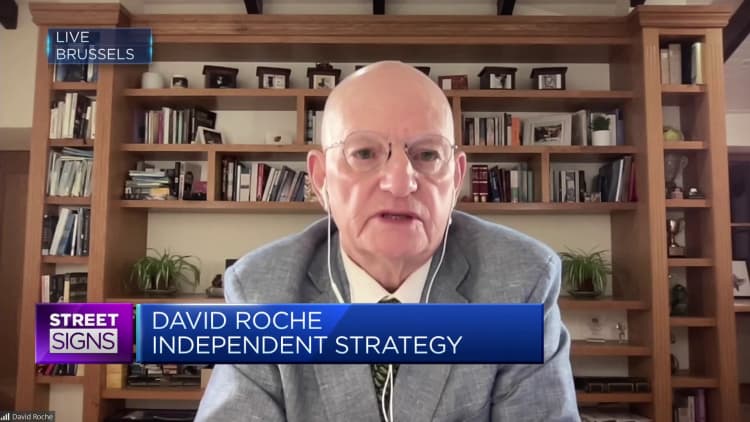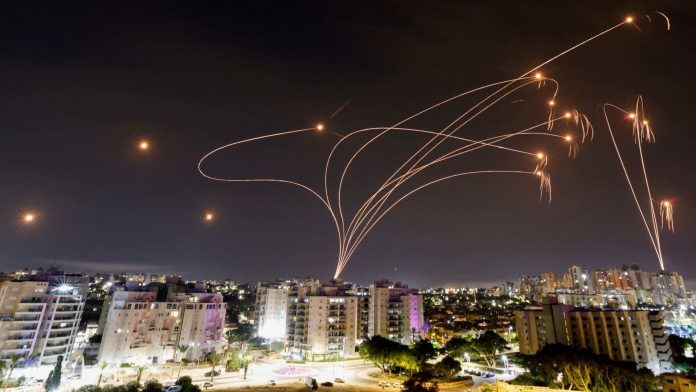Israel’s Iron Dome anti-missile system intercepts rockets launched from the Gaza Strip, as seen from the city of Ashkelon, Israel October 9, 2023.
Amir Cohen | Reuters
Israel has vowed to “exact a price” from Iran in retaliation for the large-scale aerial assault on the Jewish state this weekend â while some analysts expect Israel to respond, the timing and extent of that retaliation remains in question.
Iran launched more than 300 drones and missiles against military targets inside Israel on Saturday, in what President Joe Biden described as “unprecedented.”
“Right now, they certainly are seriously considering direct strikes on Iran, because that is a clearest path back to deterrence,” according to Ryan Bohl, senior Middle East and North Africa analyst at risk intelligence platform Rane Network.
But Israel will need to strike a delicate balance, he noted, highlighting that “they don’t want an overt conflict with Iran.”
The less risky tactic is a “covert escalation,” where the Israelis will be “looking for ways where they can get their shadow war back into the shadows with greater intensity,” Bohl told CNBC’s “Squawk Box Asia” on Monday.
While Biden has pledged an “ironclad” commitment to Israel’s security against Iranian threats, he has also made clear to Israeli Prime Minister Benjamin Netanyahu the U.S. will not participate in any offensive operations against Iran, a senior administration official told NBC News.
Ahead of a war cabinet meeting on Sunday, Israel’s centrist minister Benny Gantz vowed to “build a regional coalition and exact the price from Iran in the fashion and timing that is right for us.”
Iran has said the attack on Israel was in response to an Israeli strike on its embassy compound in Damascus, Syria earlier this month. The Islamic regime has accused Israel of the April 1 attack which killed seven Iranian military personnel, including senior commanders.
Iran’s envoy to the United Nations cited self-defense for the country’s actions.
“This action was in the exercise of Iran’s inherent right to self-defense as outlined in Article 51 of the Charter of the United Nations, and in response to the Israeli recurring military aggressions, particularly its armed attack on 1st April 2024 against Iranian diplomatic premises,” Iran’s UN Ambassador Amir Saeid Iravani said.
‘Extreme retaliation’ later?
Israel and Iran have been at odds for decades, with Iran funding and supporting groups opposing Israel including Palestinian militant group Hamas. The ongoing conflict in Gaza has often been referred to as a proxy war between Israel and Iran.Â
Tehran has also been supporting Lebanon’s Hezbollah, Yemeni Houthis as well as the Syrian regime under President Bashar al-Assad.
“Strategically, I think you will get a movement from Israel within a week,” said David Roche, president and global strategist at Independent Strategy, who does not expect Israeli forces to attack Iranian oil facilities as it would “displease all of their supporters” like the United States.

Roche said Israel’s immediate response may be moderate, but he did not rule out that an “extreme retaliation” may still be on the cards in about a year or more from now.
“If you got the most extreme form of retaliation â which I don’t think you will get now â but you will get inevitably within a year or 18 months, against Iran’s nuclear capacity, then I think you’re into a market meltdown,” he told CNBC on Monday.
In any case, what the U.S. wants is de-escalation, said Roche. “But I stress you’re de-escalating within a higher level of escalation, which is here to stay, which I think due to the nuclear threat from Iran, is destined to move higher over the next 18 months by a big jump.”
What’s next for Iran?
No matter how Israel responds, Iran is going to “try to rattle the global economy increasingly,” Bohl said â but only “just enough that the United States puts diplomatic pressure on Israel to de-escalate,” he added.
On Saturday, prior to the drone and missile strike against Israel, Iran seized an Israeli-linked container ship in the Strait of Hormuz, a critical trade route for oil.
“That sort of harassment and behavior is likely to continue in some fashion, what scale of it is probably going to be gauged by how hard Israel goes after Iran,” said Bohl.
Iran has indicated that its attack on Israel has ended for now.
“The matter can be deemed concluded,” Iran’s mission to the United Nations said on social media platform X.
However, it warned “should the Israeli regime make another mistake, Iran’s response will be considerably more severe,” adding that the U.S. should “stay away” from the conflict between Israel and Iran.
â CNBC’s Sumathi Bala contributed to this report.


